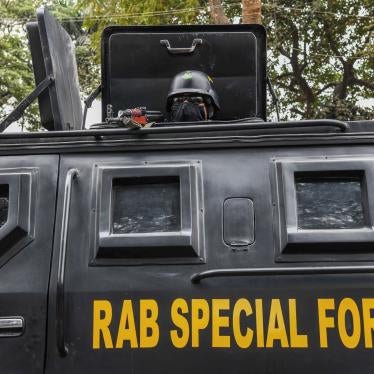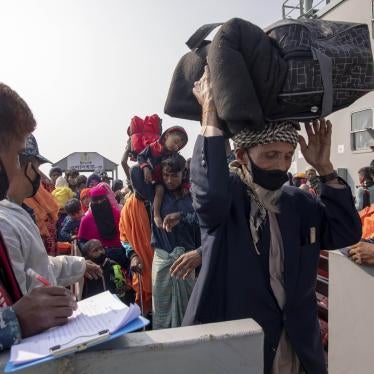Bangladesh’s government must urgently take steps to support the community-led learning facilities in the Rohingya refugee camps in Cox’s Bazar and strengthen their resources in line with the country’s international commitment to protect children’s right to education, 25 undersigned organizations said in a statement today.
About 30 community-led schools have been shut down or dismantled by the authorities since December 2021. The closure of community learning facilities in the Rohingya refugee camps in Cox’s Bazar, Bangladesh is detrimental to the community’s development and a gross violation of children’s right to education which puts them at the risk of becoming a lost generation.
Nearly half a million Rohingya refugees in Bangladesh are children, who constitute 52% of the refugees registered in the camps. They have been deprived of access to education in an accredited curriculum since they sought refuge in Bangladesh in August 2017.
In January 2020, Bangladesh’s government made a promise to introduce the Myanmar curriculum for about 10,000 children from grades six to nine. The Rohingya community has been offering education to their children through the community schools due to a delay in the rollout of the program by more than two years since Bangladesh’s government announced its plan.
Rohingya refugees said that some schoolteachers were detained by the Armed Police Battalion (APBn) and released in exchange of signing a paper with the condition that they will stop teaching.
“It is not a crime to teach students and show them the right path of life. It is a basic human right,” said a Rohingya community teacher.
Rights groups have documented allegations against authorities threatening refugees with confiscating their refugee identification cards and relocation to the remote Bhasan Char island if they violate the ban on operating or attending community-led schools.
Access to education and other human rights of the Rohingya refugees are as critical as the battle is for justice and accountability for the crimes committed against the Rohingya people. It is pivotal for their right to voluntary, safe, dignified and sustainable return to their homes in Myanmar.
“All that the community want is the formal education that will be useful to continue studying in Myanmar,” said a Rohingya youth, whose identity is being withheld for his safety.
Education is one of the most important activities that can keep the Rohingya population away from being exploited by harmful groups including child traffickers, drug smugglers, armed groups, and others who sense opportunity in people’s misery.
It is pivotal to empower the Rohingya refugees to claim their rights and speak for themselves. Loss of critical academic years is not only depriving the community of their educational development but also increasing their dependency on uncertain humanitarian aid.
The existing learning centres authorized by the government and operated by UNICEF and other humanitarian partners offer education to children from four to 14 years of age. The program leaves out the older age groups, some of whom were about to take their matriculation examination at the time of the exodus in 2017.
The undersigned 25 organizations call on Bangladesh’s government to:
-
Ensure access to education for all Rohingya children by building capacity for all learning facilities within the refugee camps including by granting legal status to community schools in line with their international commitments;
-
Immediately re-open all community schools and put a stop to all harassment, threats and attacks against refugees, avoid any discriminatory policies that affect the right to education of Rohingya children in Bangladesh;
-
Put an end to the crackdown on community-led schools and Rohingya refugees for operating them;
-
Launch prompt, transparent, impartial and independent investigation into the allegations against members of law enforcement agencies for detaining Rohingya refugees and authorities threatening them with forced relocation to Bhasan Char island for operating schools;
-
Establish and strengthen government infrastructure to provide complete access to education to Rohingya population. Ensure that any vacancies are filled by individuals with knowledge and commitment to integrating Rohingya culture and practices into the teaching modules.
The organizations also call on the United Nations and the international community to:
-
Urgently engage with Bangladesh’s government to raise concerns about the closure of community-led schools in the refugee camps in Cox’s Bazar and provide support to education for all children in the camps and elsewhere;
-
Offer assistance to build capacity for all learning facilities within the refugee camps including community schools with regards to access to teaching materials, teachers and learning spaces;
-
Allocate adequate and specific funds towards and implement education programmes and projects as part of a comprehensive and long-term commitment to support Rohingya refugees in Bangladesh.
Signatories:
-
ActionAid
-
Amnesty International
-
Arakan Rohingya National Organisation
-
Asia Pacific Refugee Rights Network
-
Bangladesh Legal Aid and Services Trust
-
Burma Campaign UK
-
Burmese Rohingya Association in Japan
-
Burmese Rohingya Community in Denmark
-
Campaign for a New Myanmar
-
Canadian Rohingya Development Initiative
-
COAST Foundation
-
Drik Picture Library
-
European Rohingya Council
-
Fortify Rights
-
Human Rights Support Society
-
Human Rights Watch
-
International Campaign for the Rohingya
-
Justice4Rohingya UK
-
Manusher Jonno Foundation
-
Map Photo Agency
-
Nagorik
-
Naripokkho
-
Robert F. Kennedy Human Rights
-
Rohingya Action Ireland
-
The Arakan Project








